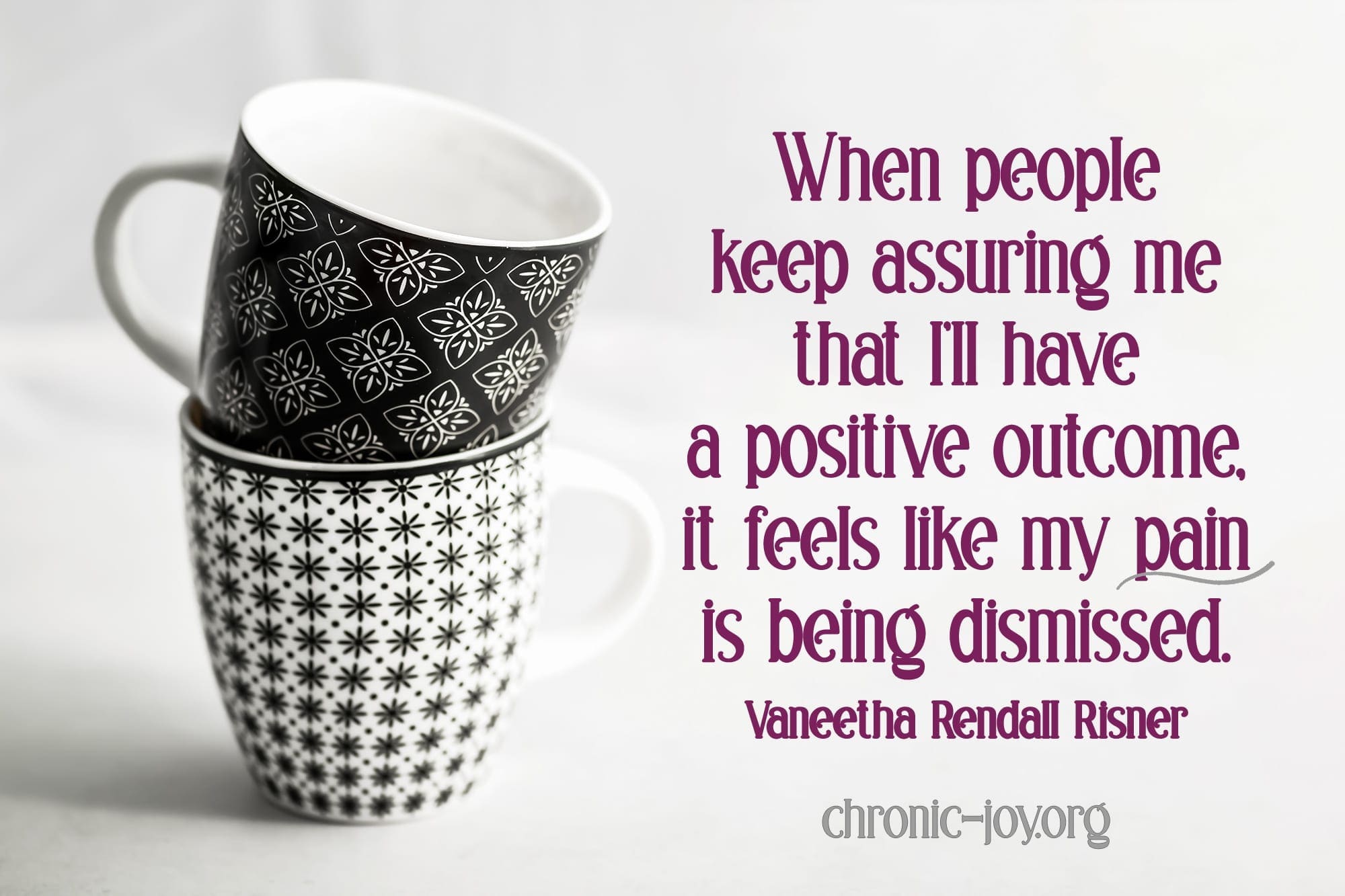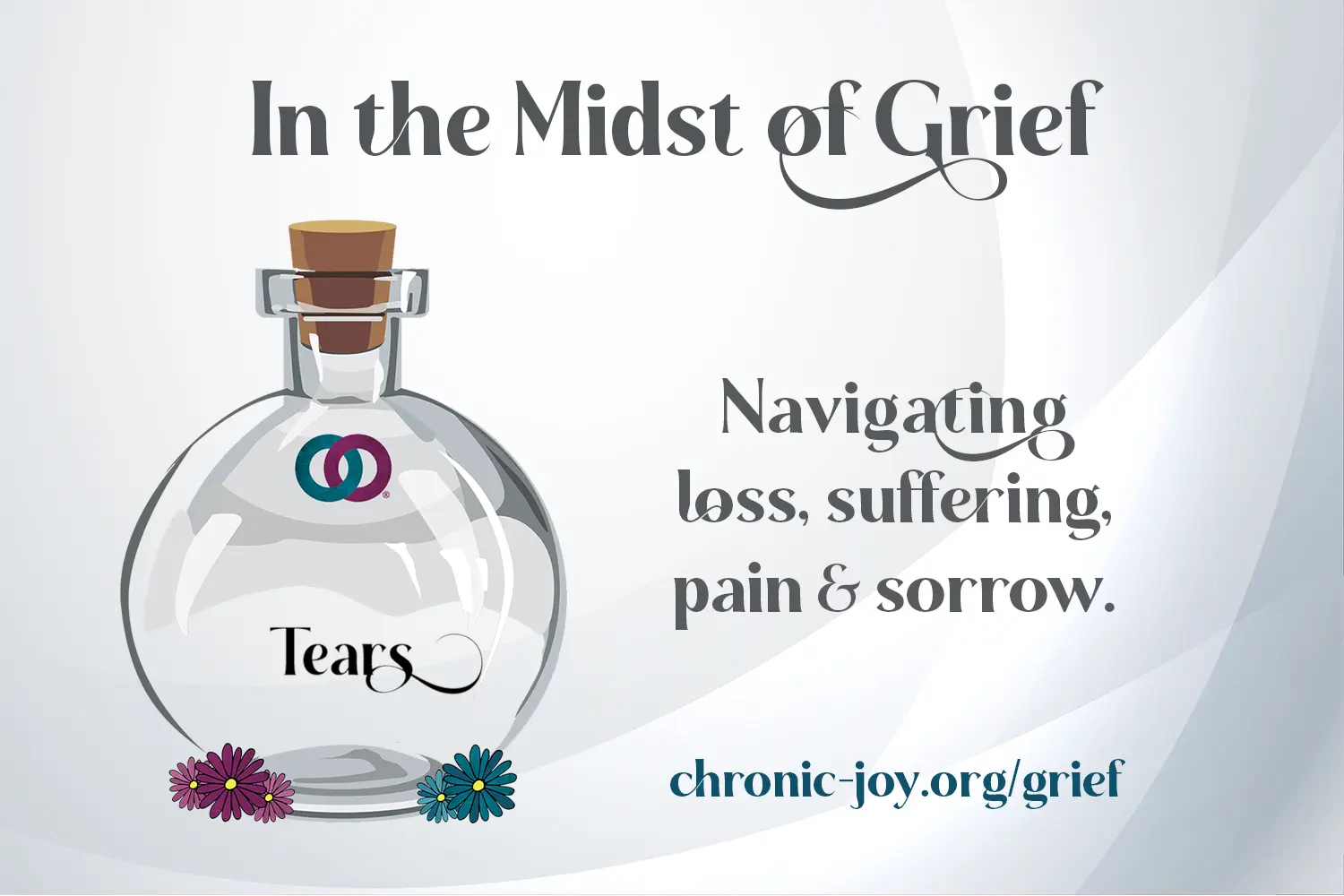
“When people keep assuring me that I’ll have a positive outcome, it feels like my pain is being dismissed.” Vaneetha Rendall Risner
IS THIS TRUE COMFORT?
A dear friend of mine recently learned that her husband has cancer.
When the doctors first detected an abnormality, they said not to be concerned. It was probably nothing … but they’d run tests just in case. Yet despite their assurances, the tests came back positive for malignancy.
My friend ran into a neighbor soon after she heard the news. Her neighbor sympathized but immediately dismissed her concerns saying that countless people get cancer and ultimately live long healthy lives. She needn’t worry. It would undoubtedly be fine.
How did her neighbor know that? What if it wasn’t fine?
My friend left that encounter feeling misunderstood and minimized. Her neighbor didn’t know how this would turn out. No one does. To my friend, easy comfort and reassurance felt hollow. She didn’t want a, “Don’t worry, it’ll all be fine,” type of comfort. That comfort feels whitewashed; it isn’t based on truth.
WHITEWASHED COMFORT
Why do we offer whitewashed comfort anyway? I have done it myself so I’m not indicting others, but I wonder why it’s our go-to comfort. Perhaps it’s because we want our friends to feel better immediately. Even if our comfort is temporal, we want them to move on and not dwell on the negative. And we subtly believe that God will be more glorified in healing and wholeness than in sickness and brokenness.
Is that true comfort? Is it helpful to hear anecdotes of people who had a good outcome? Is it really that reassuring being quoted encouraging survival statistics — that 70% of people have a good outcome, when 30% don’t? Is our comfort based on assuming we’ll be on the fortunate side?
The world only knows this type of comfort, and it is offered by most believers as well. People assured me that God would be most glorified in my infant son’s healing. Besides, his heart surgeon had an 80% success rate. But when he died at two months old, God was glorified in a different way.
MORE WHITEWASHED COMFORT
When I was first diagnosed with post-polio, friends felt sure that I wouldn’t deteriorate physically. I would beat the odds, and I would glorify God — but as post-polio is setting in, I realize I can glorify God even if my body isn’t healed.
When my ex-husband left, everyone had God-glorifying stories of broken marriages being restored. They were sure that would be our story too — but I learned that God could still be glorified after a heartbreaking divorce.
When people keep assuring me that I’ll have a positive outcome, it feels like my pain is being dismissed. And my friend felt the same way as she was constantly being “cheered up.” She wanted true comfort. Comfort that would hold her up whether the outcome was positive or negative. Comfort that would not constantly change if the news unfolded unfavorably. Comfort that was not based on wishful thinking.
WHERE CAN WE FIND TRUE COMFORT?
My friend then told me where she had found true comfort. She had memorized the Heidelberg Catechism earlier, and as she was processing the news of cancer, the words came back to her. And these words brought a waterfall of comfort, especially because her husband was a believer too. This was true comfort for both of them.
When she had first memorized this passage, they were just words. Good theology. A great framework. But now, they were like springs of living water.
I vaguely remembered the catechism when she began, “What is your only comfort in life and in death?”
She paused and then said, “That I am not my own, but belong with body and soul, both in life and in death, to my faithful Savior Jesus Christ.”
SIMPLE BUT POWERFUL
I was startled by the power of this simple statement. The greatest comfort we can have is to know that we belong to Jesus. That nothing can separate us from his love or snatch us from his hand. Our lives belong to Christ and in death we will still belong to him.
She went on, “He has fully paid for all my sins with his precious blood and has set me free from all the power of the devil.”
His precious blood has redeemed me. There is no outstanding debt with God — and Satan has no power over me, so there is nothing to fear. This is true comfort.
SCRIPTURE GIVES A PICTURE OF TRUE COMFORT
She continued speaking, enunciating her words slowly, thoughtfully. They weren’t just words. Each phrase was packed with meaning. She continued, “He also preserves me in such a way that without the will of my heavenly father, not a hair can fall from my head; indeed, all things must work together for my salvation.”
At this point, I was on the verge of tears. Scripture was woven through every line, beautifully entwined to give a breathtaking picture of true comfort.
No matter what happens, God will preserve me. He knows every detail of my life and every hair on my head. Nothing can happen to me apart from his sovereign will. Everything that happens to me is for my good and God’s glory.
GOOD BUT NOT ALWAYS PLEASANT
Though it’s for my good, it’s not always pleasant or easy. On the contrary, much of it is painful and hard and I wish it would pass me by — but I do know that it is best for me. Two pivotal passages in my understanding of God’s sovereignty that promise me that are Matthew 10:26-31 and Romans 8:28. While I generally don’t offer those Scriptures in response to the pain of others, both have brought me immeasurable comfort in my own suffering.
Why had I not meditated on this Scripture-drenched catechism question before?
She finished, “Therefore, by his Holy Spirit, he also assures me of eternal life and makes me heartily willing and ready from now on to live for him.”
TRUE COMFORT IS UNCHANGING
Because we are assured of eternal life in heaven, we can endure anything in this temporal life on earth. When we know our end is glorious, we can joyfully and willingly live for him no matter what our circumstances.
When my friend finished reciting, I was speechless. I had called to comfort her, and she was comforting me with the comfort she had received from the Lord.
I decided to commit this part of the Heidelberg Catechism to memory as well. When life falls apart, I need to remember these precious words — timeless truths, based on the eternal promises of God in Scripture.
This is true comfort, and it is unchanging.
First published at the blog of Vaneeth Risner on April 12, 2018. Published with permission.


Vaneetha Risner
Author
Vaneetha writes and speaks about meeting God in suffering. She is the author of The Scars That Have Shaped Me, Walking Through Fire, and Desperate for Hope (a Bible study). You can find her writing at Desiring God and Vaneetha.com. Vaneetha lives in North Carolina with her husband, Joel. She has two daughters, Katie and Kristi.

In the Midst of Grief
(Navigating loss, suffering, pain, and sorrow.)
Grief is no stranger to those of us affected by chronic illness, pain, and suffering. While there are no rules for grieving chronic loss, there is a road map, and fellow travelers are ahead and behind us on the journey. Grief often precedes growth.

Recent Comments